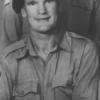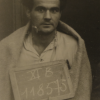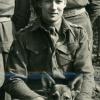Firstly, I would like to thank you all for coming to-day to pay tribute to Tim, I know that many of you have travelled significant distances and gone to a lot of trouble to be here.
We are privileged to have three Arnhem veterans here today -
John Waddy, who at the time was a company commander with 156 Bn.
Tony Hibbert ,the Brigade Major who fought alongside Johnny Frost and Freddie Gough on Arnhem Bridge.
Denis Crockett who served with the KOSBs at Arnhem
Thank you gentlemen.
Tim would have wondered what all the fuss was about and told you not to bother!
Why should we make a fuss about the passing of this man? Well to win one Military Cross is an outstanding achievement, to win three, as Tim did, is an astonishing and rare feat.
To put this into context, there were between 50,000 to 70,000 men who were employed in the British Airborne Forces between 1940 and 1948 to restore world order and freedom.
Of these, less than 20 airborne soldiers were awarded three, or more gallantry medals for actions in the crucible of battle. When you consider that this list includes such legendary names as Paddy Mayne and Roy Farran of the SAS, Tony Deane Drummond, Alistair Pearson and Johnny Frost you will appreciate that Tim sits amongst a distinguished and illustrious group.
Brigadier Arthur Sisson, one of his contemporaries said “I knew of his reputation. What a soldier, and what an appetite for a fight -- he went everywhere and did everything.”
The easiest thing to do is probably start at the beginning but inevitably my tribute will focus on the five years which irrevocably shaped him as a man.
Tim, who was also known to his friends and family as Jack, entered this world only weeks before the start of the First World War in July 1914.
He was the second of three brothers; however, tragedy struck the family when his youngest brother, Charlie, died in a house fire at the family home in Tunbridge Wells. Understandably, such a loss deeply affected him and his family.
After finishing at school Tim initially started work as a wholesale shoe rep but later joined Marks and Spencer in 1938, and I suppose that were it not for Adolf Hitler, Tim would have completed his management career with M&S without interruption until his retirement.
However as we know, things worked out differently and keen to do his bit Tim enlisted into The Grenadier Guards at the beginning of 1940. Later that year he volunteered for special duties with the embryo airborne commando unit which later became The Parachute Regiment but was sent instead to the Officer Cadet Training Unit at Sandhurst and was commissioned shortly before Christmas in 1940 into his local regiment, The Queen’s Own Royal West Kents.
Frustrated with home defence duties, he answered the second major call for airborne volunteers in August ‘41 when 11 SAS Battalion was expanded to become the 1st Parachute Brigade and in September 1941 he joined the fledgling 2nd Parachute Battalion.
I remember asking him about why he volunteered and he told me that he didn’t see why some other poor bugger should do the fighting on his behalf and since the war wasn’t coming to him he thought he had better go and find it.
And boy did he find it! Within six months he was parachuting into enemy occupied France with C Company to capture a German radar for our boffins to examine, as the commander of Rodney section. As we know the raid was a complete success and established the Paras reputation for courage and determination.
Little did I realise when I was having the regimental history drummed into me as a 19 year old recruit by my NCOs that I would have the privilege to talk first hand to a veteran of this raid many years later.
Most people would have been content with this contribution to the war effort, and he could probably have dined out on this achievement for the rest of his life, but Tim was not like most people.
After some experimental jumping at Ringway he then went on to become a liaison officer with the first US Airborne unit into the United Kingdom in World War II, and was the first British Para to get American Jump Wings sixty nine years ago in September 1942.
Not long after meeting five famous celebrities of the day, including Al Jolson and Merle Oberon at a concert for American Troops he flew the 1600 miles from Cornwall to North Africa via Gibraltar in an American Dakota and took part in the US Airborne’s first ever combat mission. He was also the first British Para to jump into combat with the US Airborne at Tebessa, in North Africa.
He rejoined A Company 2nd Para Battalion in January 43 and during February and March the 2nd Battalion was involved in intense fighting with German, Italian and Austrian Forces in North East Tunisia.
It was here that Tim won his first Military Cross for his actions between the 26th February and the 18th March 43. On one occasion when asked about Tunisia, he replied, with typical understatement, “we were a bit busy”. Unbelievable.
Well, its probably worth pointing out that while he was “ a bit busy”, barely a year after the Bruneval raid, on the 8th March, the 1st and 2nd Battalions faced an attack by four regiments, which resulted in Tim’s platoon being completely surrounded by the enemy.
Who better to describe the circumstances which the 2nd Battalion faced on just one day in Tunisia but his Commanding Officer at the time the late great Johnny Frost:
“We were to take over from a battalion of the Lincolns. They had been heavily engaged for many days and had been very considerably reduced by casualties. They were defending high ground to the south of the road, deployed on a feature called Sidi Mohammed el Kassin. This large hill was covered with cork oak woods and the sides were very steep. It was a key position for its loss would mean the cutting off of the rest of the brigade, which was deployed on both sides of the road further forward. The day before, a strong German patrol had penetrated the Lincoln’s positions and had taken several prisoners which meant that the enemy had a clear knowledge of the defensive layout.
That night in the failing light the Lincolns came down. Every single item – tools reserve ammunition, barbed wire, food and water, all had to be manhandled up and the battalion toiled and scrambled throughout the night and felt far from poised to meet the enemy as night gave place to day.
At dawn on the 8th March our battle began. A tremendous crescendo of noise came down from above. The echoing hollow crumps of mortar bombs were intermingled with the sharper thumps of artillery shells and both ripped into the trees and tore them savagely. Distinctive above all was the noise of the German machine-guns. These had a much higher rate of fire than our own, and in comparison our bren guns seemed to strike an almost apologetic note.
Time stood still. After what seemed a veritable age, our watches told us the unpleasant fact that it was still only eight o’ clock and there were many more hours of the long day ahead to cope with.
At about 10 o clock, Johnny Lane commanding A Company at the sharpest end of the battalion position came through by wireless. ‘We appear to be completely surrounded now, but do not worry, I can assure we shall be perfectly all right.”
There was little we could do to help but it was most reassuring to feel that people like Johnny had such confidence.
As the day wore on the enemy came close to achieving its objective. Although he failed to turn us off the hill he was able to infiltrate and establish small parties in between the 1st Battalion and ourselves, and indeed between our own forward companies and battalion headquarters.
When afternoon eventually came, the general bombardment lessened, though outbursts of German machine gun fire continued to remind us where they were.
‘A’ Company of the 3rd Battalion was ordered to thrust across the road to link up with part of our C Company which would move down towards them. Considerable success attended this very well led manoeuvre, for over 60 Germans were rounded up including a number of men from the Barenthin Regiment, who were considered to be specially formidable fighting men.
Gradually we could think of food. Those of us who smoked had got through packets and our mouths were furnaces. Less than a hundred yards down the road a meal was cooked and weary men from the companies came back to carry it up the hill.
However, the enemy had not had their last say, for just before it grew dark, a flight of Stukas dived on ‘A’ Company and dropped their bombs among them, making huge craters and smashing acres of trees with a numbing and bewildering effect. This final parting shot brought our day’s casualties up to nine killed and thirty five wounded.
As a sharp riposte to this last unpleasantness, John Timothy descended alone under intense fire on a small party of German machine gunners. Having dealt with six of them in one quick rush, he returned with two brand new MG 34s.”
Tim emerged unscathed from his Tunisian adventure. However, the 2nd Battalion, had suffered a total casualty rate of 80% of its establishment but in doing so it had earned, with the 1st and 3rd Battalions, the sobriquet of ‘the Red Devils’ from the Germans. As General Browning said "such distinctions are seldom given in war and then only to the finest fighting troops."
Tim was next into action in Italy behind enemy lines and you have already heard from Jon about some of his exploits which led to the award of his second Military Cross.
On his return from a Company Commander’s course at Barnard’s Castle, Tim transferred to the 1st Battalion and formally took command of R Company on the 4th July 1944.
Eventually, after a frustrating period of cancelled operations following the Normandy landings, the 1st Airborne Division was called into action to seize the Rhine Crossings at Arnhem in an effort to shorten the war.
And so, on Sunday the 17th September, Tim made his fourth and final combat jump onto DZ-X.
The exploits of the 1st Airborne Division at Arnhem have passed into legend and embody those values which The Parachute Regiment holds dear, including resolute determination and courage in adversity.
The actions of Tim and R Company are too lengthy to explain in a eulogy, suffice to say that outnumbered, outgunned, and reduced to just six men, they fought their way with bayonet to within one thousand yards of Tony Hibbert and other embattled comrades on the bridge.
Tony vividly recalls the moments of that fateful charge: “There was a sudden crescendo of staccato machinegun fire from Den Brink, and loud and clear we heard the old battle cry of the 1st Para Bn 'Wahoo Mahomet' , 'Wahoo Mahomet' that had sent such fear among the German Troops in North Africa. Gradually, over the minutes the sound diminished and then silence. I learned later that the First Battalion was down to less than 50 men before they reached Den Brink so that last bayonet charge led by Timothy, was indeed a forlorn hope, a self sacrifice to save us. That was Timothy, the bravest of the brave. I was very proud to have known him.”
The citation for his third Military Cross perhaps also provides a partial picture:
“At Wolfheze on the 17th September Major Timothy commanding R Company was ordered to attack infantry positions covered by four tanks. Despite the heavy fire he put in a most skilful attack, covered by two inch mortar smoke, and drove a superior force of enemy back thus securing an important cross-road. There, although attacked by tanks and infantry of a battalion strength, he held his ground until ordered to withdraw. He did this bringing out his casualties which amounted to 50% of his company. Later in Arnhem on Tuesday the 19th September he led the battalion attack against a German strong point. He personally led his men against two infantry guns and two armoured cars, one of which was disabled by gammon bombs. The guns were captured and rendered useless under his personal supervision despite withering fire. Later he commanded an assault against entrenched positions, his personal dash was largely responsible for the over running of these positions, this despite the fact that his company was reduced to six men. His leadership constantly inspired his men to the tremendous task set them, and it was largely due to this that so much was accomplished.”
Tim then spent a period in captivity as a POW. But by March 1945 with rumours of the Allies closing in, the camp was put on a march. Tim paired up with Major Ronnie Stark another company commander from the 1st Battalion and on the third day of the march they escaped past the German guards into a nearby wood. With the assistance of foreign land workers they remained in hiding in Germany for over a week until they established contact with advancing American forces.
On return to the UK prior to his demobilisation, Tim acted as a military adviser for the film ‘School for Secrets’ produced and directed by Peter Ustinov.
Then, like so many of his generation, he quietly slipped back into society and resumed his place as an assistant store manager with Marks and Spencer as if nothing had happened.
He went on to have a long and successful career with Marks and Spencer and at 59 Tim took well earned early retirement. After living on Exmoor he eventually settled in South Devon.
All of that would have been summarised by Tim on the back of a postcard with space to spare, such was his unswerving sense of modesty, for these were not some actions of a gung ho Rambo character but simply of a brave, courageous and decent man acting on a strong sense of duty.
Tony Costello, a veteran of the regiment who served in Palestine, recently said on a TV programme that "you’re never an ex Para you’re always a Para" and this remained true for Tim who remained Para through and through even at the age of 97. He always asked me for news of the regiment.
But for all his military achievements as a fighting soldier, my enduring memories will be of his human qualities, including his sense of humour and his modesty.
Although he was an independent and private man, his niece, nephew and wider family always remained close to his heart.
I know that I speak on behalf of those at Moors Park Care Home who looked after him so admirably over the last three years, including Matt and Nigel, and Janie my partner, in saying that it was a privilege and honour to have known him.
Tim helped to build the bedrock on which The Parachute Regiment’s, and in particular the 2nd Battalion’s, reputation is founded. Be proud of this legacy and please guard it well for Tim. We owe him, and his contemporaries, a huge debt which can never be repaid.
He was undoubtedly a man apart and to me he will always be an Emperor.
Thank you for listening.
By Harvey Grenville
Read More




Latest Comments
There are currently no comments for this content.
Add Comment
In order to add comments you must be registered with ParaData.
If you are currently a ParaData member please login.
If you are not currently a ParaData member but wish to get involved please register.